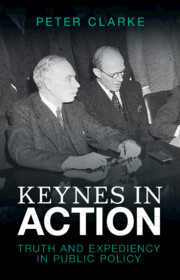Book contents
- Keynes in Action
- Keynes in Action
- Copyright page
- Dedication
- Contents
- Acknowledgements
- Introduction
- 1 What Really Happened at Paris? Keynes and Dulles
- 2 What Really Happened at Paris? The War Guilt Clause
- 3 ‘You Are Very Famous, Maynard’
- 4 The Truth About Lloyd George
- 5 Yielding to Ramsey
- 6 Yielding to Realities
- 7 Truths between Friends
- 8 Truths between Friends
- 9 The Road to Bretton Woods
- Conclusion
- Bibliography
- Biographical Works on Keynes
- Index
5 - Yielding to Ramsey
Probability Revisited
Published online by Cambridge University Press: 04 November 2022
- Keynes in Action
- Keynes in Action
- Copyright page
- Dedication
- Contents
- Acknowledgements
- Introduction
- 1 What Really Happened at Paris? Keynes and Dulles
- 2 What Really Happened at Paris? The War Guilt Clause
- 3 ‘You Are Very Famous, Maynard’
- 4 The Truth About Lloyd George
- 5 Yielding to Ramsey
- 6 Yielding to Realities
- 7 Truths between Friends
- 8 Truths between Friends
- 9 The Road to Bretton Woods
- Conclusion
- Bibliography
- Biographical Works on Keynes
- Index
Summary
In little more than a couple of years (1919–22) Keynes published three books that contrasted not only in style but in substance when they addressed a common theme: the nature of truth. Thus in the Economic Consequences he proposed a ‘ruthless truth-telling’ about what had happened in Paris. When his intimidating academic tome A Treatise on Probability was finally published in 1921, it offered a defence of objective perception. A few months later, A Revision of the Treaty suggested that truth in politics was little more than a prejudice that might be at odds with practical good. The first part of this chapter explores how Keynes sought to reconcile such views, especially under the criticism of the brilliant young Cambridge mathematician Frank Ramsey, whose insights continue to excite attention today. How far Keynes ‘yielded’ to Ramsey’s view is thus a central issue.
- Type
- Chapter
- Information
- Keynes in ActionTruth and Expediency in Public Policy, pp. 120 - 136Publisher: Cambridge University PressPrint publication year: 2022

